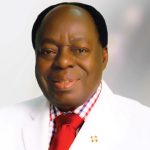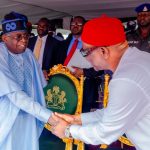
Governor Seyi Makinde of Oyo State has achieved a significant milestone by reopening a record set five years ago by late Governor Abiola Ajimobi. In a move that has elevated the status of members of the Olubadan-in-Council to crown-wearing high chiefs (kings), Governor Makinde has made history in the state.
The conflict between the then Olubadan, late Oba Saliu Adetunji, and some of his chiefs, including Lekan Balogun (then Otun Olubadan, now Olubadan) and Owolabi Olakulehin (Balogun of Ibadan land), had been a cause for concern. The peak of the crisis occurred in August 2017 when late Governor Ajimobi presented staffs of office to approximately 21 chiefs who were promoted to the status of kings.
However, Governor Makinde resolved the crisis by withdrawing the crowns of the high chiefs, including those of the Olubadan-In-Council, as part of a condition to settle out of court. Last year, the Court of Appeal in Ibadan referred the parties involved in the controversial coronation to a lower court.
Around four months ago, Governor Makinde sought the approval of the state House of Assembly to amend section 28 of the Oyo State Chieftaincy Law 2023. This amendment was necessary to allow traditional heads to wear beaded crowns based on the requests made by the high chiefs to the state government. The governor stated that the proposed amendment would empower him as the sole authority, without the need for consultations with the chiefs, to grant approvals for the wearing of beaded crowns.
As a result of these developments, Ibadan now has one Olubadan, who holds the title of imperial majesty, and ten senior-ranking obas. The ascension line to the Olubadan remains unchanged, with the Otun and Osi lines continuing in the historical path to oba.
The historic installation ceremony, which took place at the ancient Mapo Hall in Ibadan, was witnessed by a large crowd of jubilant onlookers. Traditional rulers from neighboring Ogun and Osun States also graced the occasion to rejoice with the new kings.
Governor Makinde emphasized that the elevation of the Olubadan of Ibadan to the status of imperial majesty was not an attempt to change history but rather to promote and elevate the Ibadan traditional hierarchy. He assured that the coronation of the new obas would not undermine the authority of the Olubadan or alter the Olubadan succession arrangements in any way. The governor stated that his administration aimed to consolidate and elevate the status of the Olubadan.
Despite the resistance from one of the high chiefs in the Olubadan-In-Council, Rashidi Ladoja, and opposition from some residents and indigenes of Ibadan, Governor Makinde maintained that the consenting authority was the Olubadan, not the governor. He reiterated that the elevation was in line with the requests made by the people of Ibadan.
Governor Makinde further explained that the Chieftaincy Law did not grant any new constitutional power to the governor but instead vested authority in the Olubadan, who would serve as the overall head of the newly crowned monarchs. He also stated that the coronation and promotion of the obas had the support of major stakeholders in the city, including Mogajis, community leaders, and prominent indigenes.
During the ceremony, the Olubadan, Oba Balogun, emphasized the need to reconstruct history and make it enduring and sustainable. He acknowledged that controversies and debates were common when implementing changes in the traditional system of Ibadan. He assured the public that the elevation of the high chiefs to beaded crown wearing obas was an idea with merits that should be embraced.
The Olubadan dismissed concerns about the loss of respect, honor, and prestige for the Olubadan stool due to the elevation of the high chiefs. He emphasized the sacred nature of the Olubadan stool and assured that it would remain revered. The monarch also confirmed that the elevated high chiefs would maintain their respective positions in the Olubadan of Ibadan land’s ladder.
The newly elevated high chiefs come from the Balogun and Olubadan lines. From the Balogun line, the new obas are Oba Owolabi Olakuleyin (Balogun of Ibadanland), Oba Tajudeen Ajibola (Otun Balogun of Ibadanland), Oba Lateef Adebimpe (Osi Balogun of Ibadanland), Oba Kola Adegbola (Ashipa Balogun of Ibadanland), Oba Dada Isioye (Ekerin Balogun of Ibadanland), and Oba Abiodun Azeez (Ekarun Balogun of Ibadanland). From the Olubadan line, the new obas are Oba Eddy Oyewole (Osi Olubadan of Ibadanland), Oba Abiodun Kola-Daisi (Ashipa Olubadan of Ibadanland), Oba Hamidu Ajibade (Ekerin Olubadan of Ibadanland), and Oba Adebayo Akande (Ekarun Olubadan of Ibadanland).
The newly elevated high chiefs received blessings from the head of the Labosinde family, known as the traditional kingmaker of Ibadanland. This historic event marks a significant development in the traditional hierarchy of Ibadan and demonstrates the evolving nature of the city’s traditional system in response to changing dynamics.





Comments are closed.